As part of the 2016 Spring Convocation ceremonies, McGill will bestow Honorary Degrees to fourteen distinguished individuals. What words of advice do the have for the Class of 2016? Click on the thumbnails below to watch their addresses. The most recent address appears at the bottom of the page.
This page will be updated daily.
Dr. Edwin Fuller Torrey (D.Sc., Health Sciences ceremony, Tuesday, May 31, 10 a.m.)
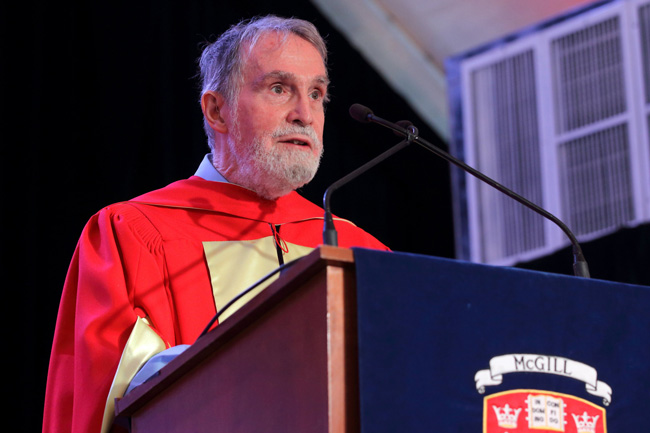
Edwin Fuller Torrey, a McGill Alumnus, has distinguished himself through a lifelong commitment to improving mental illness research, mental health care, and as an early proponent of the biological basis of schizophrenia and bipolar disorders. Dr. Fuller Torrey was founder and is the current Associate Director for Research of the Stanley Medical Research Institute (SMRI). SMRI is a not-for-profit organization which, since its inception in 1989, has supported more than $550 million dollars in psychiatric research in over 30 countries and also maintains the widely-used Stanley Brain Collection. He is also the founder of the Treatment Advocacy Center (TAC), a non-for-profit organization in the United States dedicated to eliminating barriers to the timely and effective treatment of severe mental illness.
Susan McClary (D.Mus., Music, Tuesday, May 31, 2016, 3 p.m.
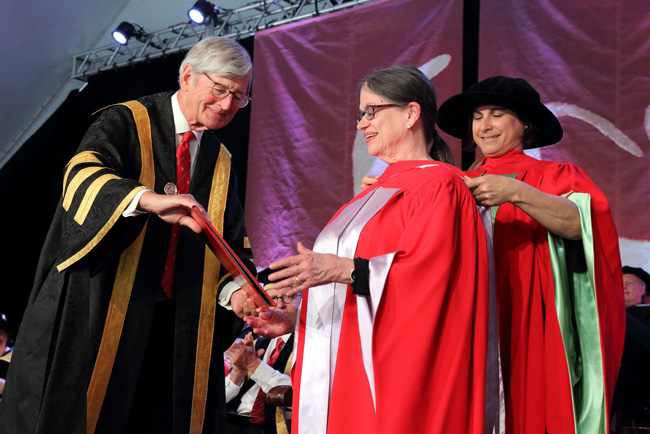
As one of the world’s leading feminist musicologists, Susan McClary focuses in her research on the cultural criticism of music, both the European canon and the contemporary popular genres. She combines the disciplines of music history and music theory, and succeeds in connecting musical details with larger social and cultural ideas. Professor McClary first came to fame with the publication of Feminine Endings: Music, Gender, and Sexuality, which examines cultural constructions of gender and sexuality. Feminine Endings, published in 1981, is considered one of the founding documents of what is known today as “the new musicology,” a movement that turns away from the dominant approach to music as a self‐contained aesthetic product, and concentrates on its relationship to social practices, gender, sexuality, and politics.
Lawrence Rossy, LL.D., Law, Wednesday, June 1, 10 a.m.
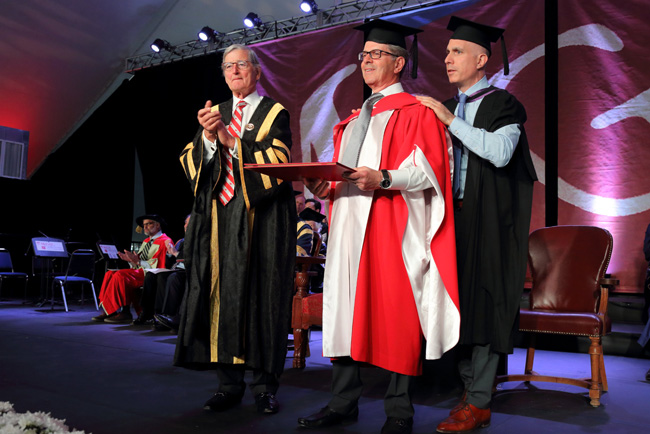
A third generation Montrealer, Lawrence Rossy followed in the footsteps of his father and grandfather, who established a thriving network of retail stores bearing the family name. In 1992, Mr. Rossy made a strategic decision to convert the company to the dollar store concept. Under his prescient leadership, his business empire has grown to include over 1000 Dollarama stores across Canada. No less impressive has been his passion for philanthropic ventures. In 2013, The Rossy Family Foundation made a transformative founding gift to launch the Rossy Cancer Network — an initiative that strives to improve cancer care, survival rates and to reduce the burden of this disease on patients and their families. In addition to health care and social causes, the Foundation has also given generously to the arts and education.
The Right Honourable Beverley McLachlin (LL.D., Law, Wednesday, June 1, 3 p.m.)
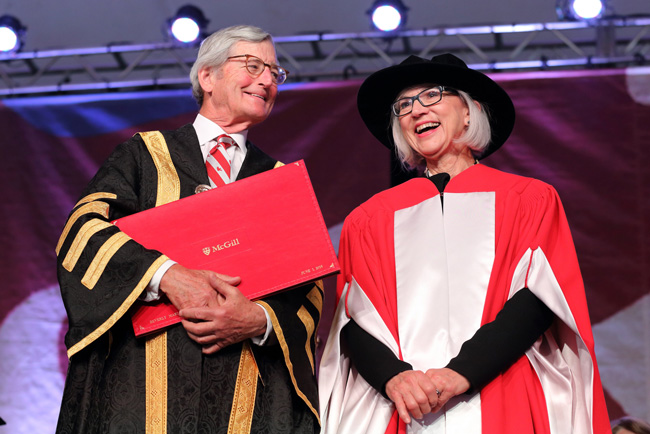
The Right Honourable Beverley McLachlin is Chief Justice of the Supreme Court of Canada. The first woman to hold this position, Chief Justice McLachlin is also the longest serving chief justice in Canadian history. One of the most experienced judges in the history of the Court, she has authored more than 400 majority decisions, including some of the most important and high‐profile rulings in the court’s history. Under her leadership, the Supreme Court of Canada has become one of the most respected courts of final jurisdiction in the world. Chief Justice McLachlin has championed equality, diversity and respect for human rights in Canada and has been a staunch supporter of reconciliation with First Nations.
Henry Petroski (D.Sc., Engineering, Thursday, June 2, 10 a.m.)
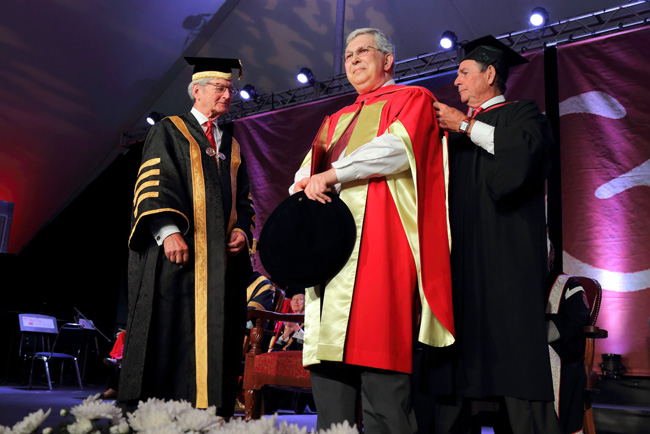
Henry Petroski is an internationally respected engineer, researcher, teacher, author and communicator who has devoted his career to furthering mankind’s understanding of technology and the role of design in modern society. His fields of expertise include structural engineering, the nature of invention, the history of engineering and technology and, most importantly, the interrelationship between success and failure in design. Often described as America’s poet laureate of technology, Dr. Petroski holds a dual appointment at Duke University in the Department of Civil Engineering and the Department of History. He is a prolific author, a much sought‐after lecturer and a frequent radio and TV commentator on engineering- and technology related issues.
Céline Galipeau (D.Litt., Education, Thursday, June 2, 3 p.m.)
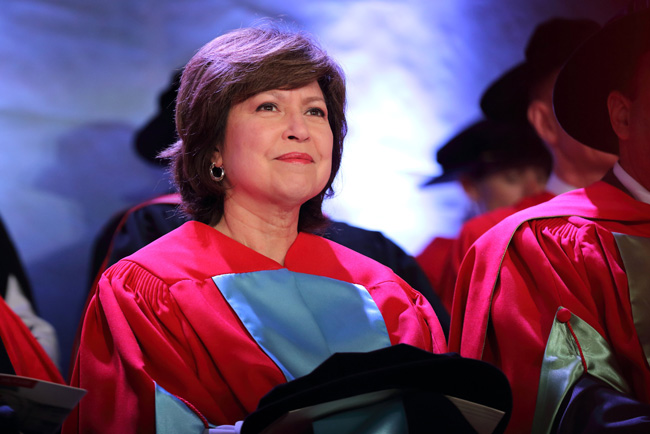
As Radio-Canada’s first female news anchor for Le Téléjournal, Céline Galipeau has been a role model for an entire generation of young women aspiring to careers in journalism. Ms Galipeau has shared some of the most important stories of our time with Canadian viewers, providing detailed insight into other cultures, gripping coverage of political turmoil around the world, and astute analysis of the news of the day. In 1995 her reports on the World Conference on Women in Beijing earned her the Amnesty International Media Award and in 2005 she was awarded the Claire L’Heureux-Dubé Award for her work on gender equality. A recipient of the Order of Quebec in 2009, Ms. Galipeau was cited for her committed, humanitarian approach to her work and in particular her dedication to reporting on the difficult and often brutal conditions women have lived under across the globe.
Dr. Ruth DeFries (D.Sc., Agricultural and Environmental Sciences, Friday, June 3, 10 a.m.)
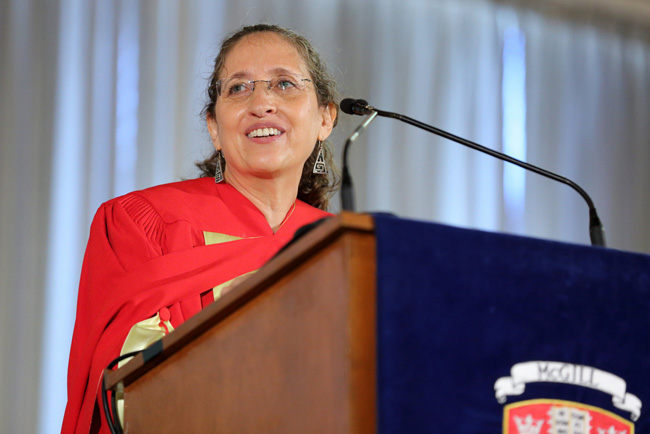
Dr. Ruth DeFries holds the Denning Family Chair in Sustainable Development in the Department of Ecology, Evolution and Environmental Biology at Columbia University. An environmental geographer and renowned scholar, Dr. DeFries research focuses on issues of sustainability, science policy, and the impact of the human race on the earth’s environment. She specializes in the use of remote sensing – aerial sensor technologies – to study the earth’s habitability under the influence of activities such as deforestation. In 2014 Dr. DeFries published the critically acclaimed book: The Big Rachet: How Humanity Thrives in the Face of Natural Crisis an optimistic view of the problems and solutions that the human enterprise has created in the quest to feed more people than ever before.
Maria Labrecque Duchesneau (D.Litt,
Agricultural and Environmental Sciences, Friday, June 3, 2:30 p.m.)
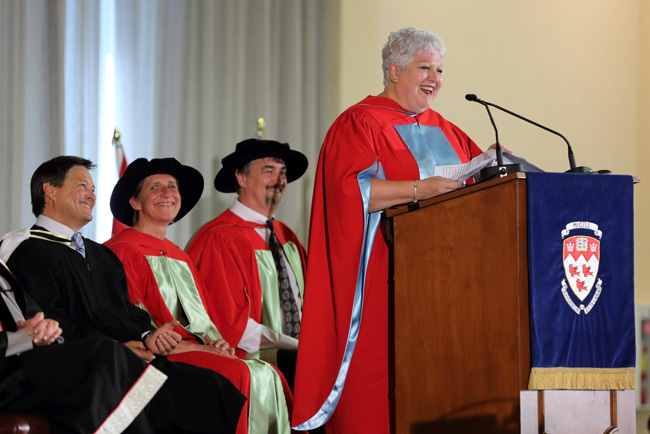
Maria Labrecque Duchesneau is a trained social worker known as the “guardian angel of the agricultural community”. Born on a farm in Quebec, Mrs. Labrecque Duchesneau knows firsthand the hardships of farming life. In 2001, she founded Au Coeur des Familles Agricoles (ACFA), a non-profit organization that works to meet the needs, both physical and psychological, of the agricultural community, while sensitizing the public to the agricultural environment. In 2013, ACFA opened a respite home in St-Hyacinthe where farmers can receive support services and obtain temporary help on their farms during their stay. ACFA has extended its services throughout Canada and has published numerous studies on agricultural producers’ health. Mrs. Labrecque Duchesneau has led very dynamic and innovative initiatives in Quebec, among them Fierté Agricole, a group whose mandate is to break the isolation in the rural community for LGBT agricultural producers.
Vinton Gray Cerf (D.Sc., Science, Monday, June 6, 10 a.m.)
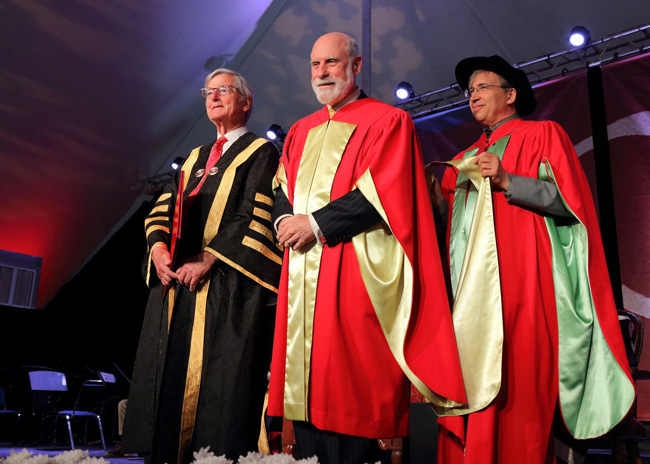
Vinton Gray Cerf is an American computer scientist who is recognized as one of the fathers of the TCP/IP protocol suite which represents the core functionality and architecture that defines the Internet. From 1982 to 1986, Dr. Cerf was vice president of MCI Digital Information where he led the engineering of MCI Mail: the first commercial email service to be connected to the Internet. In December 1997, President Bill Clinton presented Cerf and his colleague, Robert E. Kahn the U.S. National Medal of Technology for founding and developing the Internet. In November 2005, Cerf and Kahn were awarded the Presidential Medal of Freedom by President George W. Bush for their contributions to the creation of the Internet. For the past ten years, Dr. Cerf has served as a vice president at Google and was appointed “Chief Internet Evangelist” charged with expanding global access to the Internet and helping to develop policies for its application.
Paul T. Anastas (D.Sc., Science, Monday, June 6, 3 p.m.)
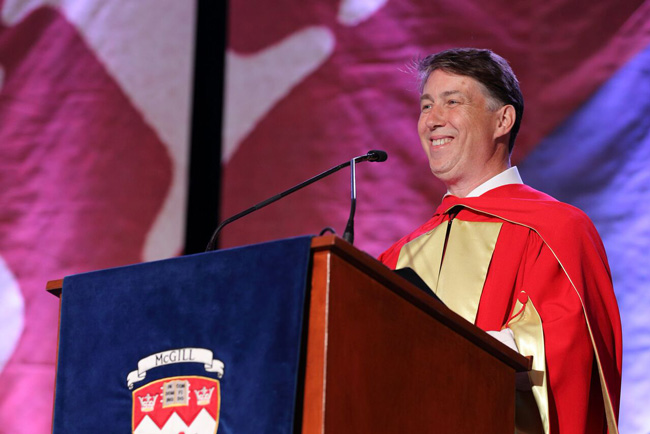
Professor Paul T. Anastas holds the Teresa and H. John Heinz III Chair in the Chemistry for the Environment, and is the Director of the Center for Green Chemistry and Green Engineering at Yale University. In 1991 while working at the United States Environmental Protection Agency (EPA) he coined and defined the term “Green Chemistry”: a framework for molecular design to ensure that the chemical and material basis of our society and economy were as benign for humans and the environment as possible. Known as the Father of Green Chemistry, Professor Anastas wrote his seminal work Green Chemistry: Theory and Practice, with co‐author John Warner, which introduced the 12 Principles of Green Chemistry. These principles are the framework for the design and manufacture of environmentally safe non-hazardous chemicals. Paul Anastas has worked tirelessly in the fields of business, policy making and academia to promote the adoption of the principles of Green Chemistry and to ensure a sustainable future for all.
Sandra Djwa (D.Litt., Arts and Religious Studies, Tuesday, June 7, 10 a.m.
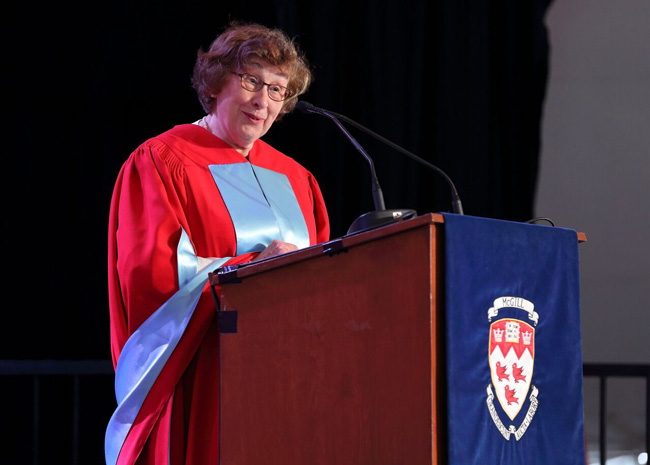
Born in Newfoundland, Sandra Djwa is a writer, critic and cultural biographer. She joined the Department of English at Simon Fraser University in 1968 where she spent her entire career before retiring in 2005 as Professor Emerita and the J.S. Woodsworth Resident Scholar in the Humanities. Professor Djwa has played an integral role in Canada’s literary history. Canadian Literature would be unrecognizable today without her lifelong efforts and dedication. She was part of a movement in the 70s that established the study of Canadian Literature as an independent discipline. In 1973, she cofounded The Association for Canadian and Quebec Literatures (ACQL), a learned society that promotes research, pedagogies, new knowledges, literary criticism and theory about the diverse literatures of Canada and Québec. Professor Djwa’s has published 10 books including three major biographies and her work has earned numerous awards and accolades.
Andreas Wimmer (D.Litt, Arts, Tuesday, June 7, 3 p.m.)
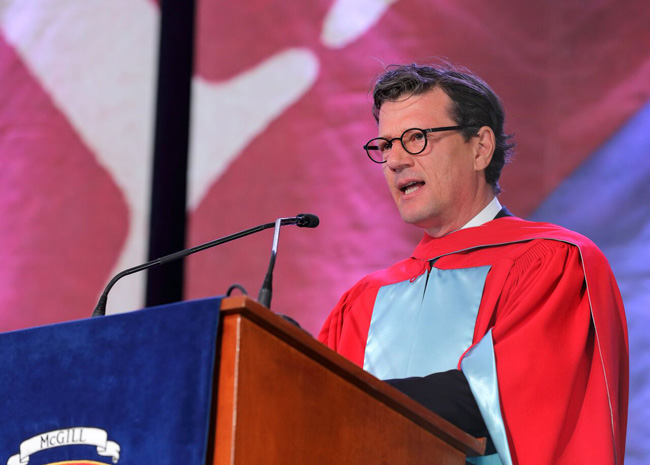
Andreas Wimmer is the Lieber Professor of Sociology and Political Philosophy at Columbia University. Professor Wimmer is considered a ‘world sociologist’ — Swiss and multilingual — he is at once sociologist, anthropologist and political scientist, with extensive expertise in quite a number of countries, from Mexico and Iraq to much of Europe and the United States. Professor Wimmer’s research based on innovative and systematic data sets has helped us understand state formation, nation building, ethnic conflict and war more than any other recent scholar. An expert on the dangers of excluding minorities from political representation, his work has created significant awareness on the importance of power sharing for preventing ethnic conflicts. Andreas Wimmer has made us mindful of the structural factors that lead to violence, whilst pointing to options that allow for a more peaceful world.
Zita Cobb (Continuing Studies, D.Litt, Wednesday, June 8, 6 p.m.)
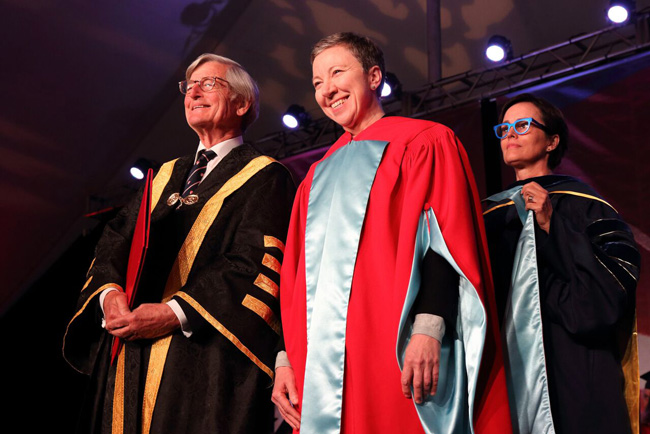
Zita Cobb is a pioneer in the field of social entrepreneurship. Growing up on Fogo Island, a remote fishing community off the northeast coast of Newfoundland, Ms. Cobb developed a deep belief in the inherent value of place and a profound respect for the human ways of knowing that emerge from respectful relationships with place. She began working at JDS Fitel, subsequently JDS Uniphase, where she collaborated with others to build the company into an extremely successful high‐tech enterprise. In 2001, Ms. Cobb retired and began her philanthropic work on Fogo Island. She recognized that traditional charity could not create community resiliency and therefore, adopted a social entrepreneurship approach to economic and cultural revitalization. Ms. Cobb’s goal was to leverage initial investments to create community‐owned economic assets with all surpluses being reinvested back into the community.
